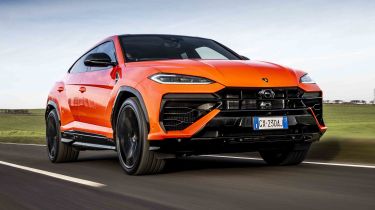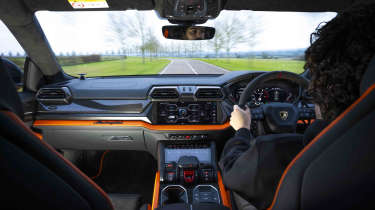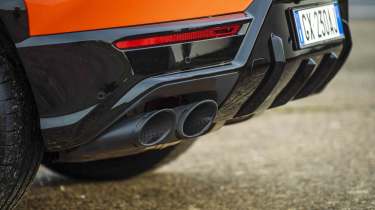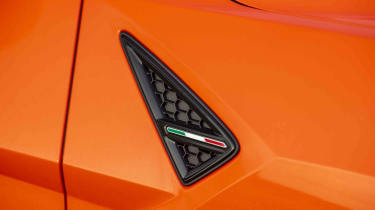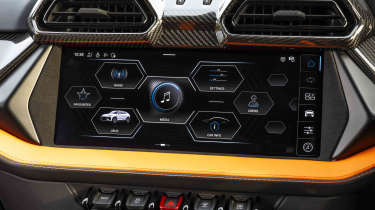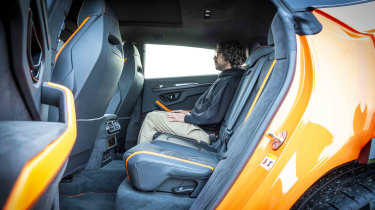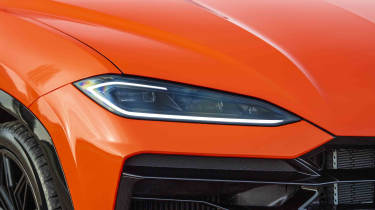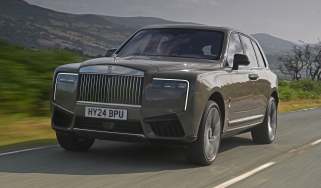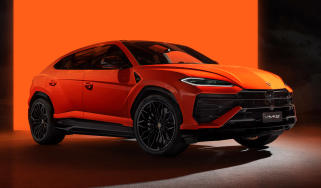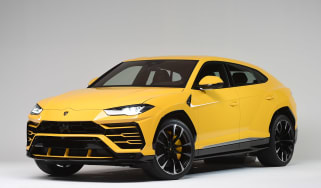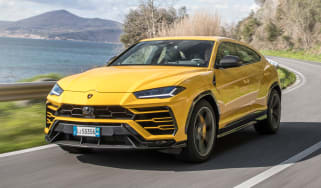Lamborghini Urus review
Traditional school-run SUVs will be cowering in fear when you rock up to the playground in your twin-turbo V8 Lamborghini Urus

Our opinion on the Lamborghini Urus
Just because the Lamborghini Urus is now a hybrid, doesn’t mean it’s gone soft. It’s just as fierce as before, with a similar level of aggression to its general driving demeanour. More power isn’t the only benefit the new plug-in hybrid system offers either, because it also brings a modest pure-electric range – although whether buyers of this very theatrical SUV will actually take advantage of it remains to be seen. The interior has been upgraded, too, including some higher-quality materials than before, although it's still not quite as plush as some rivals.
About the Lamborghini Urus
The Lamborghini Urus has been a massive success for the Italian supercar maker, having done more for the brand’s bottom line than any other model in the six years since it was introduced. The SUV game has moved on a lot in that time, but so has the Urus, and now there’s just one version to rule them all: the Urus SE.
Originally, the Urus was just powered by a 4.0-litre, twin-turbocharged V8, but now that engine is part of a plug-in hybrid powertrain and is assisted by a 197bhp electric motor. Peak power is a staggering 789bhp, with torque now at 950Nm. Plus, thanks to a 25.9kWh battery the SE can cover close to 40 miles on pure-electric power – perfect for prowling around Knightsbridge.
Used - available now
In case you’re curious, the e-motor sits between the engine and an eight-speed automatic transmission, which sends power to all four wheels. The battery pack, meanwhile, lives partially under the rear seats, next to a downsized petrol tank. The centre differential is new for the SE, and is now capable of sending up to 100 per cent of power to the rear wheels.
Lamborghini Urus prices and latest deals
The Lamborghini Urus SE costs £208,000 in the UK. But there is little chance you’ll walk out of a showroom only paying that much, though, because options are both expensive and numerous. The model we drove was only moderately specified, yet the options still raised the total to nearly £300,000. We’ll talk about how exactly in a little bit.
Unfortunately, the Lamborghini Urus is one of the few cars you can’t order brand new through the Auto Express Buy A Car service. However, there are often several used examples ready and waiting in dealerships around the country that you could snap up instead, with prices currently starting from just over £130,000.
Performance & driving experience
Pros |
|
Cons |
|
While the addition of the hybrid system and electric motor means the Urus SE pumps out 132bhp and 100Nm of torque more than the old all-V8 Urus Performante, they haven’t come without cost. That penalty is roughly 300kg of extra weight, so performance is a little down compared with the Performante.
There’s also an electronically-controlled limited-slip differential at the rear, four-wheel steering, an active anti-roll system and the latest air suspension technology on dual-valve adaptive dampers. These elements are controlled through a somewhat mystifying collection of seven drive modes, but the only ones you’ll need to worry about are the basic Strada, Sport, Corsa and Ego – the rest are options for use off road.
Within each of these is a selection of four further powertrain settings, made up of EV, Hybrid, Recharge and Performance. EV mode does as it says, with Hybrid making a good fist of combining the e-motor and V8 to smoothly operate around town. Recharge will do the same, but puts a little more emphasis on the V8 to not only hold the current battery charge level, but slowly add to it as well.
| Model | Power | 0-62mph | Top speed |
| Lamborghini Urus SE | 789bhp | 3.4 seconds | 193mph |
Performance, 0-60mph acceleration and top speed
It may weigh in at more than 2.5 tonnes, but the 0-62mph in 3.4 seconds is still more than fast enough for the Lambo to remain right at the pinnacle of the class, as is its 193mph top speed. You can reach up to 83mph purely using the electric motor when you’re just driving the Urus around town.
But flick one of the drive-mode levers and you can then engage Hybrid, where a generous prod of the throttle will awaken the V8 with all the fanfare you’d expect. There is no subtle slipping in and out of use, as you’ll find in a plug-in Bentley.
This is all well and good, but none of these modes screams Lamborghini in the same way as a naturally aspirated V12 engine, which is where the final Performance powertrain mode comes in. It’s here that the unit essentially acts as a pure combustion engine, with the e-motor there purely as a form of added propulsion.
Town driving, visibility and parking
Pull away in EV mode and there is some jerkiness as the e-motor’s power is sent through the gearbox, but it’s actually the tuneless piped-in sound that initially grates. Rather than sounding futuristic, or whatever else Lamborghini was aiming for during development, it instead has the irritating warble of a worn wheel-bearing. It’s not a great start.
You sit lower in the Urus than in most SUVs, and while this fits the Lamborghini’s sporting feel it does mean visibility is not as good. It can be hard to place the car in town or tight parking spaces, although it’s less of an issue on the open road.
Country road driving and handling
With Performance mode selected, the Urus SE is able to build some serious speed in the process, but the chassis and its hardware now feel more adept than was the case with the slightly wild previous-generation car. There’s not a huge amount of feel, and the active anti-roll bars can make it a little tricky to get a sense of how much grip is available from the front tyres, but the quick steering and augmented powertrain shoot you down the road with confidence at an incredible pace.
Somewhat unsurprisingly, this car improves at speed – put some load into the suspension and the normally lumpy ride is smoothed out, while the e-motor better integrates itself into the overall powertrain. Stopping power comes from a set of carbon-ceramic brakes, which come as standard and are actually the biggest fitted to any production car on sale right now.
Motorway driving and long-distance comfort
As part of its upgrade to the SE from, the motorway and high speed comfort of an Urus has markedly improved. Refinements to its air suspension have given the Lamborghini a smoother high-speed ride quality, with better control over bumps. The old car was always ultra-stable, but when on the largest 23-inch wheels – as most were specified with – it could crash into potholes, sending an unpleasant shudder through the cabin.
The SE and its new dual-valve dampers help eliminate this feeling, while not giving an inch to overall body control. However, something shared between the old car and new are the uncomfortable seats, which feel flat and too firm. The Urus is impressively refined, though, especially with the acoustic glass option, and the engine is able to settle right down at a cruise and operate nearly as quietly as the same unit does in a Bentley Bentayga.
MPG & running costs
Pros |
|
Cons |
|
The Urus SE might be a plug-in hybrid, but this is still a Lamborghini and it drinks a colossal amount of fuel, as you’d expect one to. During our testing, the car returned close to the 21.8mpg Lamborghini says it will do with a depleted battery.
The company claims the Urus SE can return up to 49mpg, but to us that seems pretty much impossible unless you were spending a lot of time driving on the electric motor, with the thirsty V8 in hibernation, then charging the car at the end of every journey.
We think it’s also worth highlighting that one potentially limiting factor for those tackling longer road trips in the Urus SE is its smaller 75-litre petrol tank compared with the 85-litre item in the previous models.
| Model | MPG | CO2 | Insurance group |
| Lamborghini Urus SE | 49mpg | 140g/km | 50 |
Electric range, battery life and charge time
Lamborghini also quotes a 37-mile pure electric range, which is ambitious. This number is a best-case scenario, and considering base Urus SE models run on relatively tiny 20-inch wheels, the move up to the 23-inch items our car (and most, let’s be honest) will run on will see that figure plummet. During our chilly test drive in mid-winter, we barely managed 10-15 miles.
Insurance groups
Group 50 insurance means the Lamborghini Urus falls into the most expensive category, as you would expect. Repair and replacement costs, coupled with extreme performance, are enough to give the average underwriter a cold sweat.
Tax
Not that many in the market for an Urus will care about fuel consumption, but it’s possible some will be more tempted to buy one now because of tax benefits for plug-in hybrids. Especially if you planned to buy it through a business. However, the Urus SE produces 140g/km of CO2, compared to a BMW M5 Touring – which also features a V8 hybrid powertrain – that emits 45g/km, making it (and others) a better company car choice.
Depreciation
The flip side of potentially ruinous running costs is the fact that the waiting list for the Urus has kept resale values incredibly resilient. Despite it now being nearly seven years since it was launched, a used Urus costs around £130,000 in the UK – wild when you consider the original price was little more than £165,000 in 2018, and the fact these cars all have substantial mileage, given they’re often used as a daily driver.
To get an accurate valuation on a specific model check out our free car valuation tool...
Interior, design & technology
Pros |
|
Cons |
|
Alongside the substantial changes under the skin, the Lamborghini Urus received some fresh styling and interior elements when the new SE model was introduced. Matrix headlights now sit on either side of a new bonnet that now extends right down to the front-end’s air intakes. This removes the unsightly part line of the previous model, making the whole car look much cleaner.
The rear end is also new, apparently inspired by the second-generation Gallardo with a full-width artificial grille section and a change of number plate location. The effect is subtle, but also effectively cleans up the overall design.
As you’d expect for a car with a starting price north of £200k, the basic equipment is all there and includes:
- 21-inch alloy wheels
- Carbon-ceramic brakes
- 12.3-inch driver’s display
- 12.3-inch central touchscreen
- Wireless Apple CarPlay and Android Auto
- Blind-spot monitoring
- Panoramic camera system
- Matrix LED headlights
As we said, the Urus SE we drove cost £300k thanks to its insanely vivid Ad Personam paintwork, CorsaTex and carbon-fibre interior packages, 23-inch wheels, contrasting roof and Bang & Olufsen sound system. However, there are plenty of other options available, from a titanium exhaust system to a roof box and bike carrier.
Interior and dashboard design
Inside, Lamborghini has fitted a brand-new dash to accommodate the larger 12.3-inch display. You still get another touchscreen below that for all the climate controls, but the touch-sensitive controls that used to sit between them have been replaced with a new set of toggles, which are lovely to use.
Materials and build quality
Most interior elements are also covered in expensive-feeling leather or, in the case of our test car, CorsaTex, which is Lamborghini’s version of Alcantara. This gives the whole cabin a definite uplift over most SUV rivals, but there are still too many elements from Audi, including the steering wheel controls, indicator stalks and window switches. These are all well built, but a little disappointing considering the price point.
Sat-nav, stereo and infotainment
The new touchscreen has been borrowed from Porsche and Bentley, and is now larger, at 12.3 inches. This sits above an Audi-sourced lower touchscreen for the heating, ventilation and seat controls, which works relatively well for these secondary functions. However, while the hardware is improved, with more digital real estate and better graphics, the interface is still tricky to navigate.
Most functions, such as accessing Apple CarPlay or switching off the active driver aids, are buried in menus that aren’t logical to access. There is a certain amount of personalisation to the overall system, but not enough to make the most difficult tasks less of a pain.
Our car was fitted with an upgraded Bang & Olufsen sound system – which was excellent but expensive, at around £5,000 – but there are two other set-ups available. The driver’s information display is also borrowed from Audi and features a range of bespoke graphics that are dependent on the driver mode. We found there is a limited number of personalisation options, though, and once again the actual hardware is starting to feel its age.
Boot space & practicality
Pros |
|
Cons |
|
There’s only a five-door bodystyle on offer, and the Lamborghini Urus comes with a traditional three-seater rear bench as standard. We’d advise going for a model with a panoramic roof to help bring some much-needed light into the rear cabin. The seats are relatively comfortable, but no more, and while the added options of massage and cooling are a nice bonus, they lack the ultimate support you’d hope for from such a high-performance SUV.
Dimensions and size
| Model | Lamborghini Urus SE | Aston Martin DBX S | Range Rover Sport SV |
| Length | 5,112mm | 5,039mm | 4,970mm |
| Width | 2,016mm | 1,998mm | 2,047mm |
| Height | 1,638mm | 1,680mm | 1,814mm |
| Wheelbase | 3,003mm | 3,060mm | 2,997mm |
| Boot space | 454 litres | 638 litres | 522 litres |
There’s no doubting the Lamborghini Urus has road presence. Even if it didn’t look quite so dramatic, being 5,112mm long and 2,016mm wide this turns heads. It’s slightly bigger than the Aston Martin DBX, although doesn’t take up quite as much space as the Bentley Bentayga. The Urus is considerably lower than the Bentayga, standing 1,638mm tall compared to the 1,742mm Bentley.
Seats & passenger space
There’s plenty of room in the Lamborghini’s front seats, but the sloping, low-roofed body extracts a price in the back, where both headroom and legroom for six-footers is in short supply. Additionally, the narrow window glass and relatively low seating position can make the rear seats feel a little claustrophobic – that’s quite at odds with the light and airy feel of many luxury SUV rivals.
Rather surprisingly, the Urus features three sets of ISOFIX mounting points for child seats. One is located on the front passenger seat, while the others are found on outer seats in the back.
Boot space
The conversion to plug-in hybrid power has seen the boot space in the Urus shrink from 616 litres down to 454 litres in the SE. There’s no underfloor storage, and therefore nowhere clever to store the charging cable if you plan to take it with you. It is possible to fold the rear seats down if you need more space, though.
Reliability & safety
Pros |
|
Cons |
|
Lamborghini’s low volumes mean the Urus doesn’t undergo Euro NCAP safety tests, but the fact it shares most of its fundamental chassis and powertrain designs with five-star models such as the Porsche Cayenne and Audi RS Q8 means it should still be a safe place to be if the worst happens.
Plus it comes with various safety and driver-assistance systems, including the usual airbags all-round, adaptive cruise control, exit warning function, crash mitigation measures, pedestrian detection and protection, plus high-beam assist.
Reliability is also more resilient than many might expect given that it’s built by an Italian supercar maker, but the SE’s plug-in hybrid powertrain is new and still unproven.
Buying and owning
Alternatives
The ‘hyper-SUV’ segment is one that Lamborghini arguably created when the Urus was launched in 2018, sitting above cars such as the Porsche Cayenne Turbo or BMW X6 M with its class-leading power figures and eccentric design.
It’s more often considered a rival for the highest-end Range Rover models, plus the more agricultural Mercedes G-Class – or it was in 2018, because now there’s a whole new era of fast four-door rivals it has to compete with.
The most obvious is the Ferrari Purosangue, which costs in excess of £100,000 more than the Urus SE and comes with a pure-bred V12 engine, plus much more in the way of high-end bespoke chassis elements and design.
The Aston Martin DBX – especially the new DBX707 and DBX S models – feels much more akin to one of its two-door siblings both in feel and its shared components, while there is also the BMW XM, which is arguably closest to the Lamborghini, thanks to its plug-in hybrid powertrain and angular looks.
Dig deeper and you might consider the Range Rover Sport SV and the rugged Land Rover Defender OCTA, or the Porsche’s Cayenne Turbo E-Hybrid with the GT Package, which essentially apes the former Turbo GT, but with its own plug-in hybrid powertrain fitted.
Frequently Asked Questions
When it comes to sheer drama and road presence, there are few cars - let alone SUVs - that can match the Lamborghini Urus. It’s even more versatile now thanks to its new plug-in hybrid powertrain, but we wish the interior was plusher, especially for a car costing more than £200,000.
